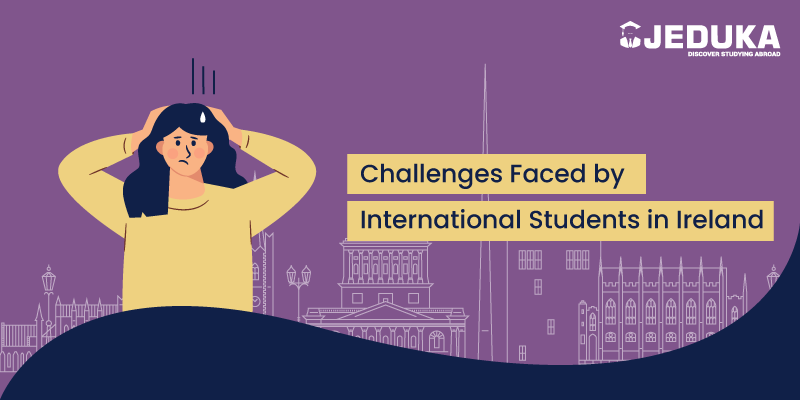Published Date: 27th February 2023
Ireland has become a popular destination for international students seeking higher education. With the country's renowned universities, multicultural environment, and vibrant social scene, it's no wonder that thousands of students from around the world choose to study here. However, along with the many benefits of studying in Ireland come several challenges that international students face. In this blog, we'll explore some of these challenges and discuss how they can be overcome.

1. Language Barrier
The most common challenge that international students face in Ireland is the language barrier. Even though English is widely spoken in the country, many international students still struggle with the language. This can be due to different dialects, accents, and idioms, which can be difficult to understand for non-native speakers.
To overcome this challenge, international students can take English language courses offered by their universities or outside institutions. They can also practice their language skills by participating in conversation groups or engaging in conversations with native speakers. Another helpful tip is to watch movies, TV shows, and listen to radio programs in English to improve their comprehension.
2. Cultural Differences
Another challenge that international students face in Ireland is the cultural differences. Ireland has a unique culture that can be very different from what international students are used to in their home countries. For instance, the Irish people are known for their friendliness, hospitality, and love for pubs. International students may find it difficult to adjust to this culture and may feel isolated or homesick.
To overcome this challenge, international students can try to learn more about Irish culture by participating in cultural events, attending festivals, or joining clubs and societies. They can also make friends with locals and other international students, which can help them feel more at home.
3. Financial Challenges
Financial challenges are another common issue that international students face in Ireland. Studying in a foreign country can be expensive, and many international students have to manage their finances carefully to make ends meet. Tuition fees, accommodation, food, and transportation costs can add up quickly, leaving little room for leisure activities.
To overcome this challenge, international students can look for part-time jobs to supplement their income. Many universities in Ireland offer part-time work opportunities on campus, such as working at the library or student center. They can also look for jobs outside the university, such as in restaurants, cafes, or shops. It's essential to note that international students can only work up to 20 hours per week during the academic year and up to 40 hours per week during holidays.

4. Housing Issues
Finding suitable accommodation can be another challenge for international students in Ireland. Many universities offer on-campus accommodation, but it can be expensive, and spaces are limited. Off-campus accommodation can be more affordable, but it can be challenging to find a suitable place, especially in cities like Dublin, where the demand for housing is high.
To overcome this challenge, international students can start their search for accommodation early and be flexible with their choices. They can look for shared apartments or houses with other students, which can be more affordable and offer a social environment. It's also essential to be aware of the rental market's regulations and rights, such as the deposit and rent payment terms, to avoid potential issues.
5. Academic Challenges
International students may face academic challenges when studying in Ireland. The academic system and teaching styles may differ from what they are used to in their home countries. Moreover, the academic workload can be intense, with assignments and exams that require extensive reading and research.
To overcome this challenge, international students can attend orientation programs offered by their universities, which can help them understand the academic system and expectations. They can also seek help from their professors, academic advisors, or student support services, which can offer guidance and resources to improve their academic skills. Finally, international students can also join study groups or work with peers, which can help them stay motivated and on track with their studies.
6. Social Isolation
Social isolation can also be a challenge for international students in Ireland. Being away from family and friends can be difficult, and the lack of a social support system can lead to loneliness and homesickness. Moreover, cultural and language differences can make it challenging to connect with others.
To overcome this challenge, international students can join clubs and societies, attend social events, and participate in extracurricular activities. This can help them meet new people and make friends with similar interests. They can also connect with other international students, which can provide a sense of belonging and support.

7. Healthcare Access
International students in Ireland may face challenges accessing healthcare. Healthcare in Ireland can be expensive, and many international students may not be covered by the public healthcare system. Moreover, navigating the healthcare system can be challenging, especially for non-native speakers.
To overcome this challenge, international students can purchase private health insurance, which can provide coverage for medical expenses. They can also familiarize themselves with the healthcare system, such as knowing where to go for emergency care or accessing primary care services. It's also essential to carry a copy of their health insurance policy and any necessary documents, such as a passport, to avoid potential issues.
Conclusion
Studying in Ireland can be an exciting and rewarding experience for international students. However, it's important to recognize and address the challenges that come with studying in a foreign country. By understanding these challenges and taking steps to overcome them, international students can have a fulfilling and successful experience in Ireland. From language barriers to financial challenges, housing issues, academic difficulties, social isolation, and healthcare access, international students must take proactive measures to tackle these challenges and make the most of their time studying in Ireland.

1. What are the main challenges faced by international students in Ireland?
International students in Ireland face several challenges such as cultural differences, language barriers, adjusting to a new educational system, high cost of living, and finding suitable accommodation. Additionally, they may experience feelings of isolation and homesickness, especially during the initial period of their stay. It is important for universities to provide adequate support services to help international students overcome these challenges and have positive academic and personal experiences.
2. How can language barriers be overcome by international students in Ireland?
International students can improve their language skills by enrolling in language classes, practicing with native speakers, and participating in language exchange programs.
3. What support services are available to international students in Ireland?
International students can access support services such as counseling, academic advising, and financial aid. They can also join student organizations and clubs to meet new people and build social networks.
4. How can international students in Ireland overcome financial constraints?
International students can explore scholarships, part-time jobs, and other financial aid options. They can also create a budget and stick to it, and find cost-effective ways to enjoy their time in Ireland.
5. How can international students in Ireland deal with social isolation?
International students can join clubs and organizations, volunteer in local communities, and participate in cultural events. They can also connect with other international students and attend social events organized by their universities.
6. How can international students in Ireland cope with academic pressure?
International students can seek academic support from their professors, tutors, and academic advisors. They can also manage their time effectively, stay organized, and practice self-care to avoid burnout.
7. What are the benefits of studying in Ireland for international students?
Studying in Ireland can provide international students with opportunities to learn about a new culture, improve their language skills, expand their professional networks, and gain valuable international experience. Ireland also has a reputation for high-quality education and offers a variety of degree programs. You will see more reasons here: Why Ireland is the best study abroad destination?
8. How can international students in Ireland adjust to a new educational system?
International students can attend orientation sessions, seek advice from academic advisors and professors, and learn about the expectations and requirements of their courses. They can also reach out to classmates and form study groups to better understand the coursework.
9. Are there any visa or immigration challenges that international students in Ireland may face?
Yes, international students in Ireland may face challenges in obtaining and renewing visas, meeting immigration requirements, and navigating the immigration system. They should stay informed about the latest regulations and seek guidance from their universities or legal advisors.
10. How can international students in Ireland prepare for their future careers?
International students in Ireland can attend career fairs, workshops, and networking events, and gain work experience through internships or part-time jobs. They can also seek guidance from career services centers and alumni networks. Additionally, they can research job markets and requirements in their fields of interest. Do not miss this article: Career Opportunities After Studying in Ireland
11. How can international students in Ireland cope with homesickness?
International students can stay in touch with family and friends back home through video calls, social media, and email. They can also seek support from their university's counseling services or join social groups and activities to meet new people and make connections.
12. Are there any cultural or social events in Ireland that international students should participate in?
There are many cultural and social events in Ireland that international students can participate in to learn more about Irish culture and meet new people. Some examples include St. Patrick's Day, traditional music sessions, and cultural festivals.
13. What are some ways for international students in Ireland to stay healthy and active?
International students can participate in sports and fitness activities, explore local parks and hiking trails, and join clubs or organizations related to their interests. They can also seek out healthy food options and prioritize getting enough sleep and rest.
14. How can international students in Ireland deal with homesickness during holidays?
International students can plan ahead and make arrangements to celebrate holidays with friends or family, either in Ireland or virtually. They can also participate in local holiday traditions and events to feel more connected to their new community.
Read Also
8 Reasons to do Postgraduate Studies in Ireland
Career Opportunities After Studying in Ireland
How to Apply to Universities in Ireland?









Categories: Ireland
Tags: Study Abroad